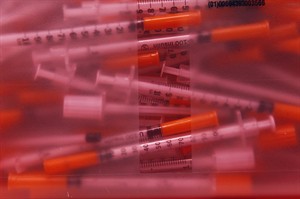
Inmates need needle-exchange programs and better access to HIV treatment: study
VANCOUVER – A new study suggests federal and provincial inmates are more likely to be infected with HIV because of the lack of adequate treatment in facilities where syringes are shared.
Researchers at the BC Centre for Excellence in HIV/AIDS say authorities need to urgently improve HIV treatment and promote programs such as needle exchanges.
The study conducted between May 1996 and March 2012 involves interviews every six months with 657 inmates who were HIV positive and used injection drugs.
Lead author Dr. M-J Milloy says the study found that HIV could be detected in a prisoner’s bloodstream at a much higher rate — meaning they’re more likely to pass on the infection.
But when those same people were not behind bars, the study found the infection rate fell to 62 per cent because they received treatment.
Milloy says that although some inmates chose not to disclose they were HIV positive to prevent being stigmatized, others could not access specific medications they’d started before they were incarcerated or experienced delays in getting their prescriptions filled.
Join the Conversation!
Want to share your thoughts, add context, or connect with others in your community? Create a free account to comment on stories, ask questions, and join meaningful discussions on our new site.



















Leave a Reply
You must be logged in to post a comment.